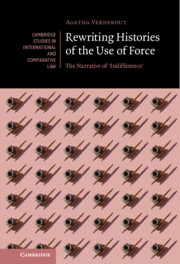Book contents
- Rewriting Histories of the Use of Force
- Cambridge Studies in International and Comparative Law: 160
- Rewriting Histories of the Use of Force
- Copyright page
- Contents
- Foreword
- Acknowledgements
- Abbreviations
- Introduction
- Part I The Use of Force in Nineteenth-Century Doctrine
- Part II The Use of Force in Nineteenth-Century Practice
- Part III The Narrative of Indifference in the Twentieth Century
- 8 Disciplinary Beliefs about International Law and the Narrative of Indifference
- 9 The Emergence of the Narrative of Indifference in the Interwar
- Conclusion of Part III
- Conclusion
- Bibliography
- Index
- Cambridge Studies in International and Comparative Law
9 - The Emergence of the Narrative of Indifference in the Interwar
Preserving Identity by Restoring Credibility
from Part III - The Narrative of Indifference in the Twentieth Century
Published online by Cambridge University Press: 10 September 2021
- Rewriting Histories of the Use of Force
- Cambridge Studies in International and Comparative Law: 160
- Rewriting Histories of the Use of Force
- Copyright page
- Contents
- Foreword
- Acknowledgements
- Abbreviations
- Introduction
- Part I The Use of Force in Nineteenth-Century Doctrine
- Part II The Use of Force in Nineteenth-Century Practice
- Part III The Narrative of Indifference in the Twentieth Century
- 8 Disciplinary Beliefs about International Law and the Narrative of Indifference
- 9 The Emergence of the Narrative of Indifference in the Interwar
- Conclusion of Part III
- Conclusion
- Bibliography
- Index
- Cambridge Studies in International and Comparative Law
Summary
The previous chapter having demonstrated how the narrative of indifference can be traced back to international law’s disciplinary identity, this chapter seeks to understand when and why this historical account emerged and still dominates scholarship. It brings a twofold ‘emotional’ explanation. The first relied on the work of Festinger and argues that ‘indifference’ emerged during the interwar as a narrative remedy for a cognitive dissonance between the belief that international law is a vector of order and the events of World War I. It transformed a failure of international law into a triumph of international law. It allowed the discipline to restore coherence between beliefs and facts and, by the same token, salvage the inside and outside credibility of the discipline. The second explanation highlights how the narrative of indifference can also be read as an expression of ‘exultant relief’ at the culmination of 50 years of pro-arbitration efforts on the part of international lawyers.
Keywords
- Type
- Chapter
- Information
- Rewriting Histories of the Use of ForceThe Narrative of ‘Indifference', pp. 270 - 313Publisher: Cambridge University PressPrint publication year: 2021

